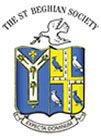|
 |
The Old St Beghian | |
| January 2023 | |||
Ian Chapman (G/AC 73-80) writes about the Drama Society.
“During the 1970s St Bees School Drama Society featured people who later became international figures in the entertainment industry. I was in plays on the Memorial Hall stage with one of them. There was only one play a year, always in the last week of the Easter term.
For me it began in 1977 when the English master, David Marshall, told me to go to the play audition, where producer Peter Broadhurst would be expecting me. I went along, a fourth form 14 year old among mainly sixth formers. The producer told me they needed boys to play women on stage, two sixth formers were playing older women, would I play a younger one. I liked the people I saw at the audition and agreed then and there. Peter asked was I worried about my classmates' reaction to seeing me walking around in a dress. I said no and maybe laughed.
The next year the school had some thirty day girls, and the play was fully co-educational. This was Strindberg's 'Ghost Sonata', a rarely performed Swedish play, and Peter Broadhurst's masterpiece. The opening scene on a street in early 1900s Sweden was brilliantly staged, receiving a collective gasp from the audience as the curtain raised. Peter taught art and painted much of the scenery himself. I had one of the leading roles, a bit young for it really. Peter said to me that he wished he'd taken the play on tour. And it was probably one of the top English school productions of that year. Strangely, a television play aired the same year. In the later 1980s I watched a theatre production at the London South Bank. In some ways our St Bees’ version held up with those professional companies. Physics teacher, Chris Robson, filmed some of the dress rehearsal; footage may yet exist somewhere.
In 1979 it was 'The Hollow Crown', a musical performed in school uniform. The next year, the first of the fully co-educational school, the play was ‘Alice in Wonderland'. I had no part at all. An Upper Sixth former, I was put in charge of the cloakroom. I sent the two junior boys with me down into the auditorium to watch the play, and then watched through the cinema projection slot both nights.
The best thing about the Drama Society was the people, particularly the actors. The school was very hierarchical and structured, in years and houses. There was also a lot of vicious bullying. In the play, people of different ages mixed together, and bullies were completely absent among the actors. There was a sort of apprenticeship system, where you started by playing women as a junior, then graduated to the leading roles. The two famous ones are Rowan Atkinson and Adrian Johnston. Rowan left in 1972, the year before I arrived, and is now world famous. Adrian was a year ahead of me, and I was in three plays with him. In the first one 'Black Comedy', Adrian played the Colonel, father of my debutante, although he was Ophelia the year before. He was the top musician in the school and a leading figure in the Cumbria Youth Orchestra. I coincided with him for a sixth form term on Abbots Court and was lucky enough to spend some time with him and others as he listened to old records he used to buy in second hand shops of the time. Guys like myself and Stu Head would respectfully listen with Adrian as he tuned-in to old 45rpm and 78rpm vinyls. Adrian Johnston is an international television and film-score composer. He has won a US Primetime Emmy and a UK BAFTA award for musical scores.
There were also the backstage Drama Society members. Lighting were very competent. Makeup was led by Phil Barrett and Anthony Payne, teachers of science and languages. They were very good, and to this day I have no idea where they learned such skills.
A tradition was that during play week we actors would keep on hair dye and nail varnish, saying the apparently magic words 'It's for the play, sir!' if questioned. I recall seeing James Mansfield walking by the library wearing a blue fedora hat and a white silk scarf, to protect his hairstyle and theatrical voice. Almost apoplectic, Deputy Headmaster Dearle waylaid him; James managed to keep the hat on in the rainy weather. James Mansfield became a professional theatre and television actor.
There was an element that openly detested the Drama Society, among both students and teaching staff. We went against the authoritarian, conformist and militaristic ethos apparently. The 1970s was a strange decade, as though we lived partly in black-and-white and partly in colour.
I always liked mixing with my elders. After the 1979 performance some of the seniors who had already left school dropped by backstage to say hello personally. Keith Jones, and Joanna Fox with Howard Batey there like a bodyguard; that meant a lot to me. During the first 1977 production I went over to School House to practise some speeches with Steve Cartner. Normally other houses were rarely visited and age groups didn't mix. After rehearsing the lines Steve asked if I'd like a cup of coffee, and he put some toast on too. As the toaster popped up, as if on cue James Mansfield walked into the study. The two sixth formers ate the toast but I did get a coffee!”
Home
The St Beghian Society
St Bees School,
St Bees, Cumbria, CA27 0DS.
Tel: (01946) 828093 Email: osb@stbeesschool.co.uk
Web: www.st-beghian-society.co.uk
![]()